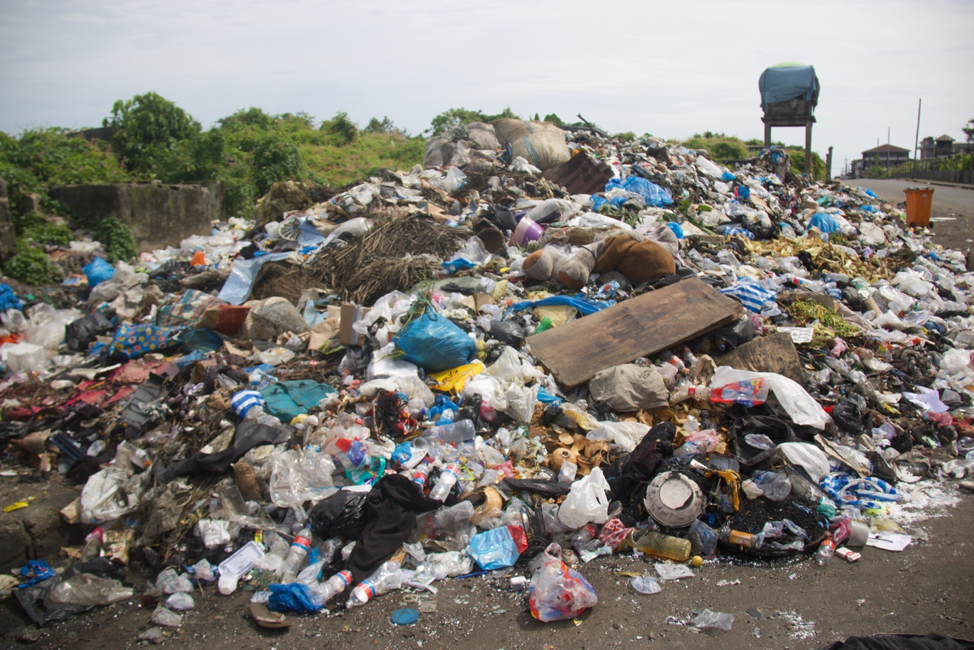Top: U.S. Ambassador to Liberia Michael A. McCarthy. Photo credit: U.S. Embassy near Monrovia
By Gabriel M. Dixon
MONROVIA – U.S. Ambassador to Liberia Michael McCarthy has criticized the condition of the sanitation system of Monrovia in a witty opinion piece also tearing into the leadership of the country.
In a thinly veiled criticism of the city government and garbage system, McCarthy contrasted the cleanliness of villages he has lived in other West African countries to one of the oldest cities on the continent.
“As a Peace Corps volunteer, I was blessed to live for two years in villages (without electricity or running water) in West Africa,” McCarthy said in an opinion Tuesday as Liberia celebrated the 213th birth anniversary of its first president, Joseph Jenkins Roberts.
“First thing every morning, each household would take advantage of the cool, early morning daylight to sweep inside and outside and dispose of debris. Villagers then coordinated with the local government to deliver waste daily to a designated landfill.
“The state of cleanliness in the city of Monrovia, which is more developed and a far wealthier community, sadly does not compare,” he added.
Monrovia is home to more than 1 million people who produce close to 800 metric tons of solid waste per day. The city alone creates 292,000 metric tons of waste every year. However, only 45 percent or 360 metric tons of waste is collected mainly by the Monrovia City Corporation and small and medium enterprises (SMEs) operating in the sector. The remaining 55 percent or 440 metric tons is uncollected, leading to huge piles of garbage at market places, street corners, empty lots and the backyards of residences.
The city government has often attributed its waste disposal challenges to a lack of funding and capacity. McCarthy said he was “surprised” at the city’s leadership that donors were not supporting solid waste management as they did in the last three years.
“Is there a more basic local government responsibility than the collection and proper disposal of garbage?” He quipped.

Records also support McCarthy’s disagreement with the city’s leadership. On 28th June 2017, the World Bank committed a grant of US$17.5 million for the Cheesemanburg Landfill and Urban Sanitation Project for Liberia. The project, which will expire in June 2023, is meant to support increased access to solid waste management services in Monrovia.
Also, in 2021, the United States was among the top-three largest contributors to the International Bank for Reconstruction and Development (IBRD) and the International Development Association (IDA), both of whom are World Bank groups and instruments through which the Bank provides loans, guarantees, risk management products, and advisory services to middle-income and creditworthy low-income, and low-interest loans and grants to the world’s poorest countries.
McCarthy’s opposite the editorial (op-ed) entitled: “What would Joseph Jenkins Roberts Have to Say About Liberia Today?” also criticized the Liberian government over corruption, transparency and accountability, human rights, “and other acts that threaten the peace and security of Liberia.” He repeatedly implied Roberts, accredited for being the pioneer for Liberia’s foreign relations, for his support to nation-building and contribution to the Liberian education system, would have something to say about the state of affairs of the country he helped establish in 1847.
It comes barely six months after the Head of the European Union Laurent Delahousse said in October last year Monrovia was the “dirtiest” city in Africa he had lived in. Delahousse came under heavy criticism for that statement he made at an event on solid waste management. He later retracted his statement but it had already sparked a heated debate on the sanitary condition of Monrovia and its environs.




